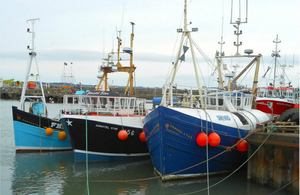UK fisheries agreement signed with the Faroe Islands
UK and the Faroe islands have signed a continuity agreement which enables UK vessels to continue fishing in Faroese waters after 31 October.

UK fishing vessels
UK and Faroese governments have signed an agreement to ensure UK fishermen can continue to access and catch fish in Faroese waters after the UK leaves the EU on 31 October.
Currently the UK fleet fishes in Faroese waters under the EU-Faroe Islands fisheries agreement. When the UK leaves the EU and becomes an independent coastal state this current agreement will cease, however the new agreement, signed yesterday (15 October), ensures that the existing arrangements between the two countries remain in place until the end of 2019.
The UK is committed to continuing to work together the Faroe Islands, providing certainty for respective industries and managing shared fish stocks sustainably.
These arrangement will:
- honour the existing access arrangements agreed, in as far as they concern the UK and the Faroe Islands
- ensure that appropriate licencing, control and enforcement provisions are in place, following the model agreed by the EU and Faroe Islands, to enable fishing opportunities to continue to be enjoyed by both the UK and Faroe Islands for the remainder of 2019
- honour the existing quota exchanges for 2019, and existing access arrangements between the UK and the Faroe Islands
This complements a separate agreement signed on the 30 September 2019 between the UK government and Norway to ensure similar continuity arrangements.
In further preparation for exit day, a new licensing authority - the Single Issuing Authority (SIA) - has also been set up jointly by the England, Scotland, Wales and Northern Ireland administrations. This will ensure fishermen have the correct licences to fish legally after leaving the EU.
The SIA is calling on vessels owners in the over 12 meter fleet to ensure their vessel has an IMO number, which will be needed to fish outside UK waters when we leave the EU.
Owners of vessels are urged to register now for an IMO number from the International Maritime Organisation to enable the timely processing of the subsequent licensing documentation.